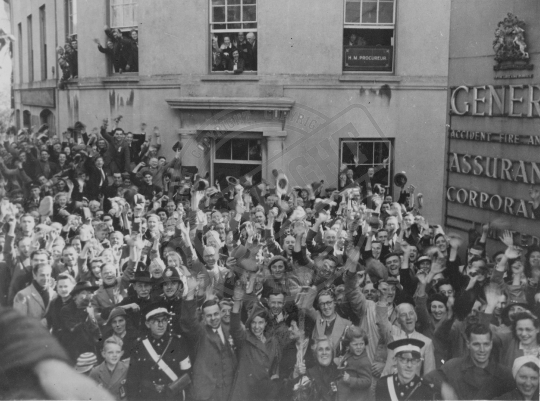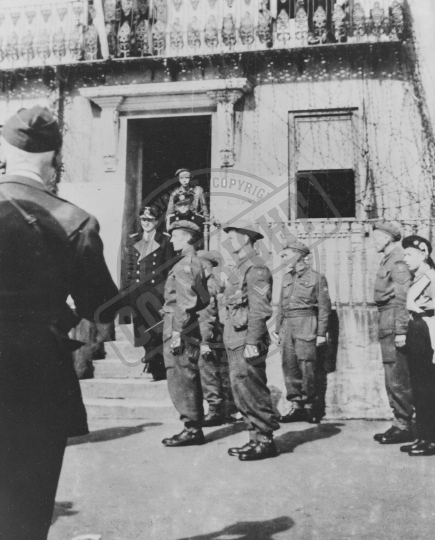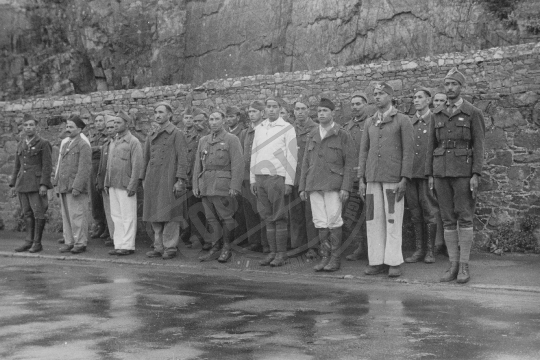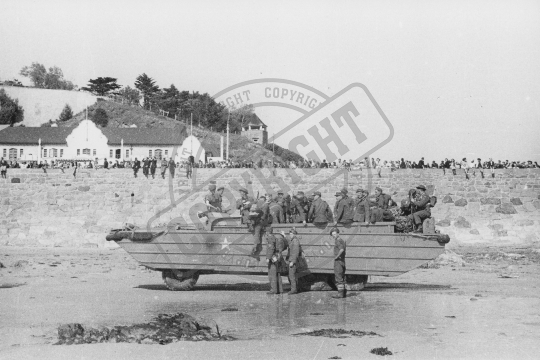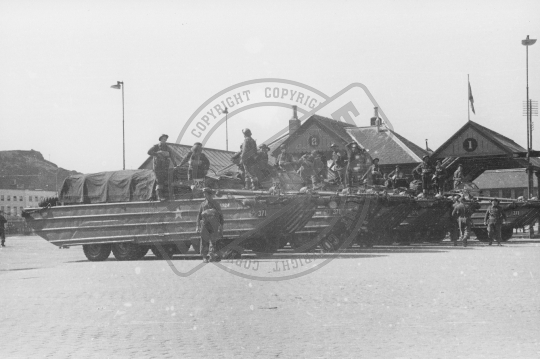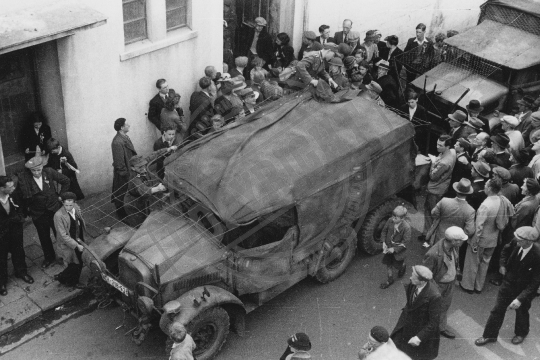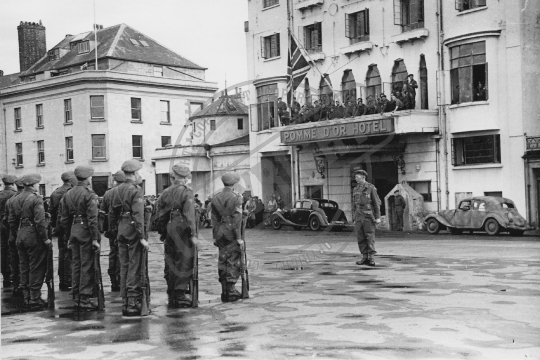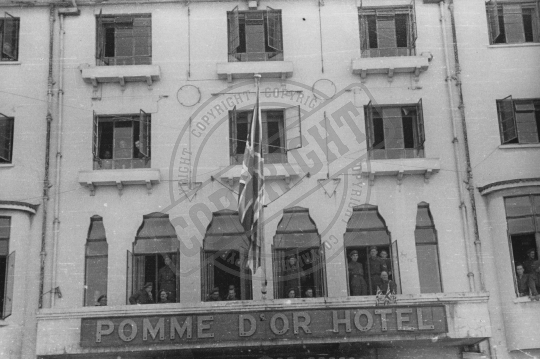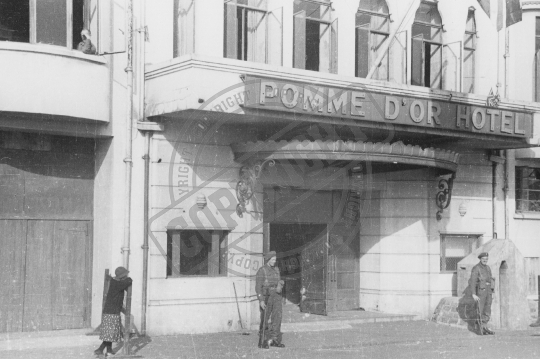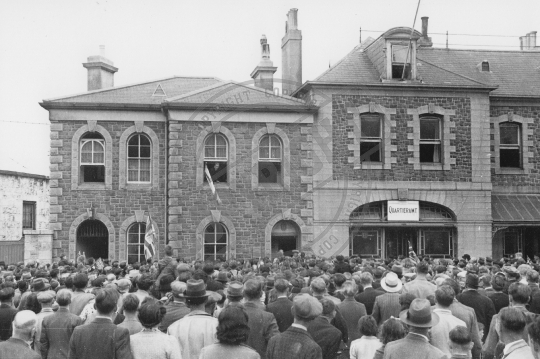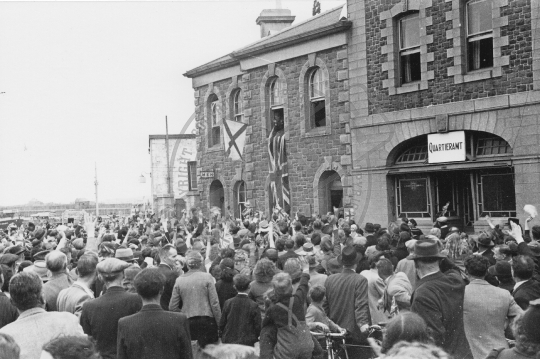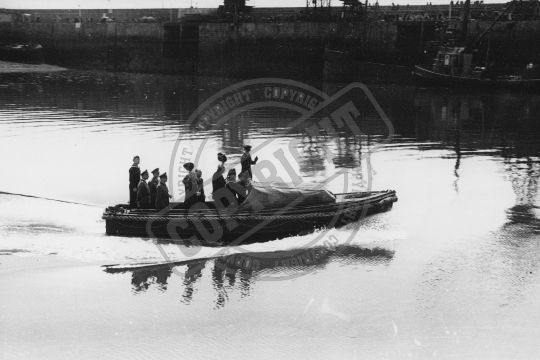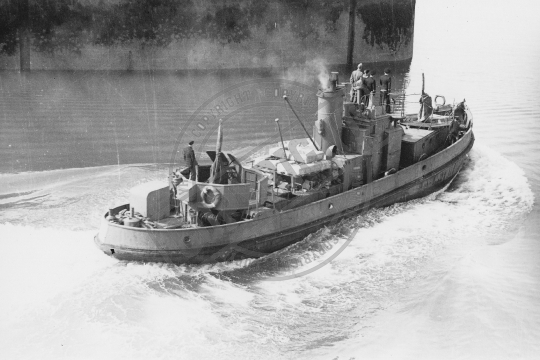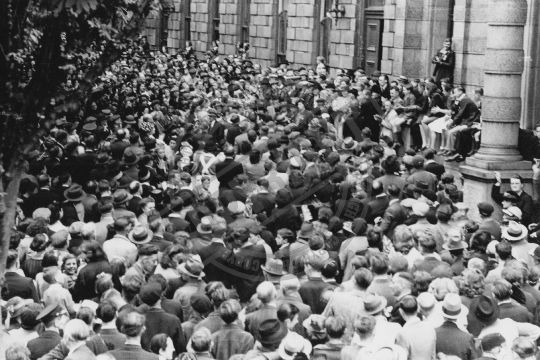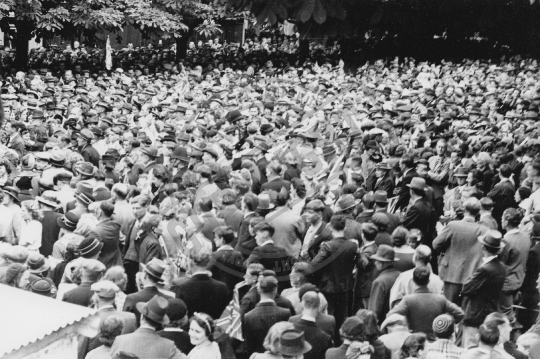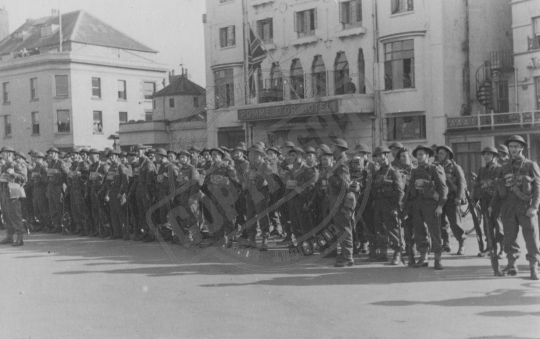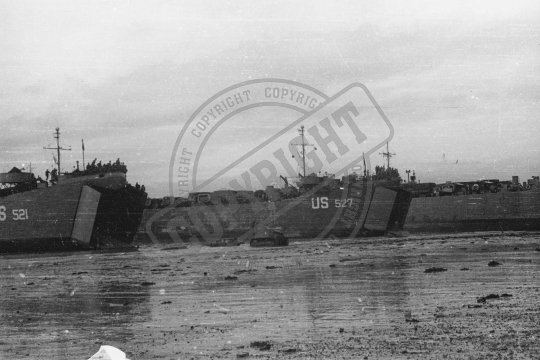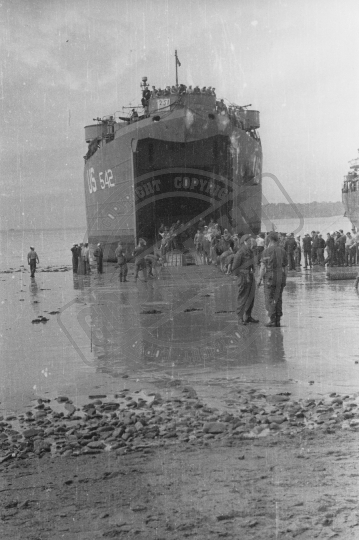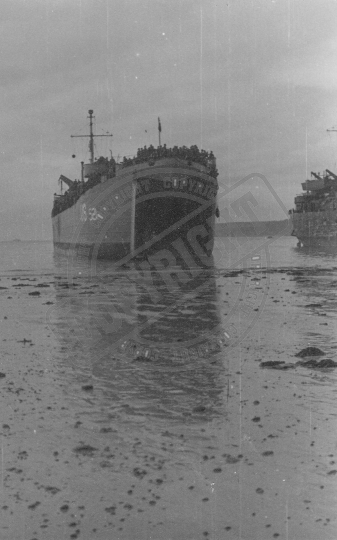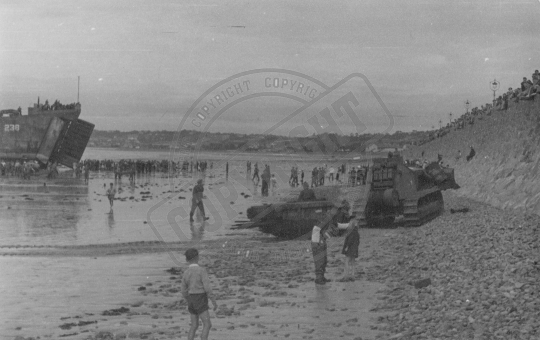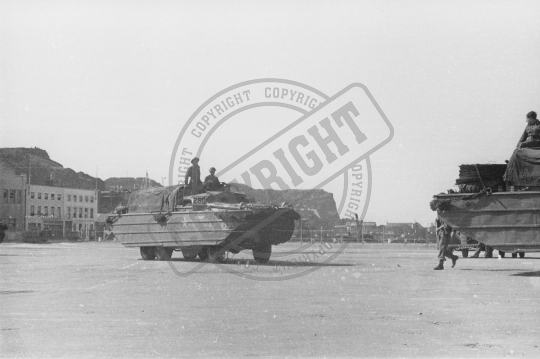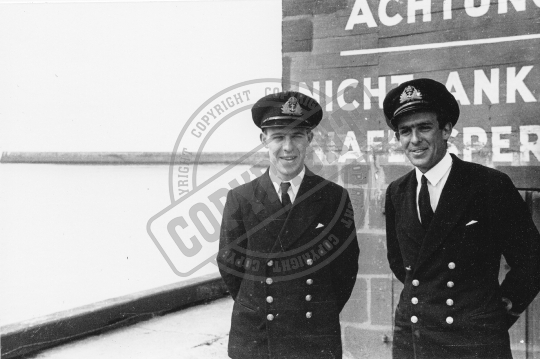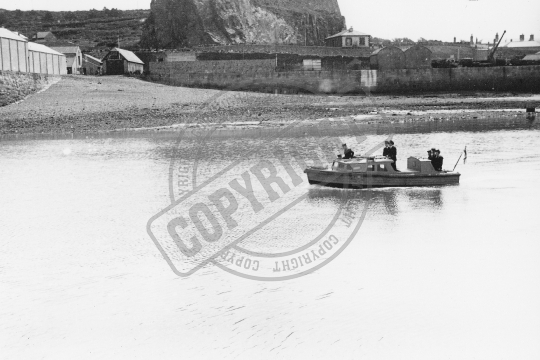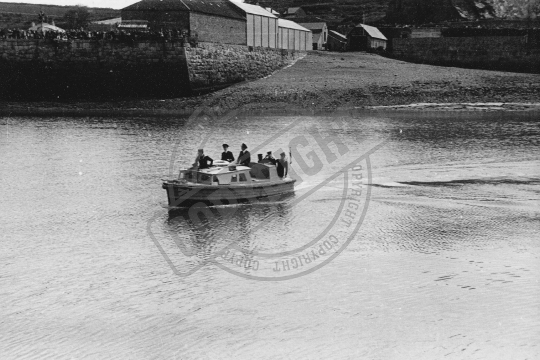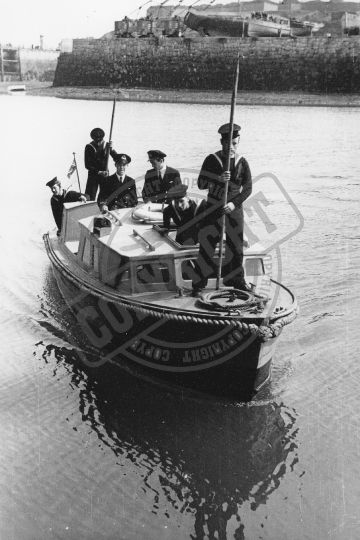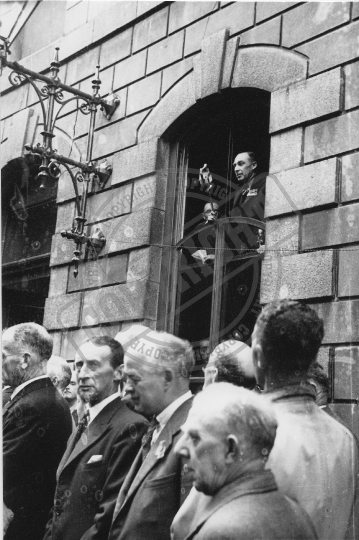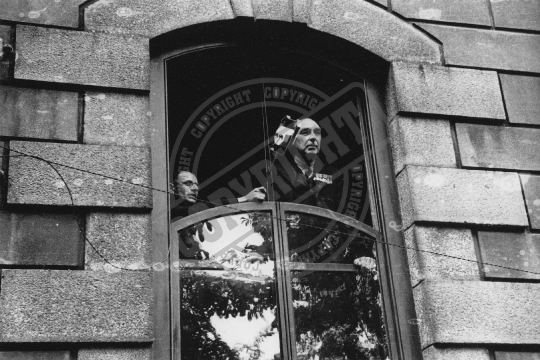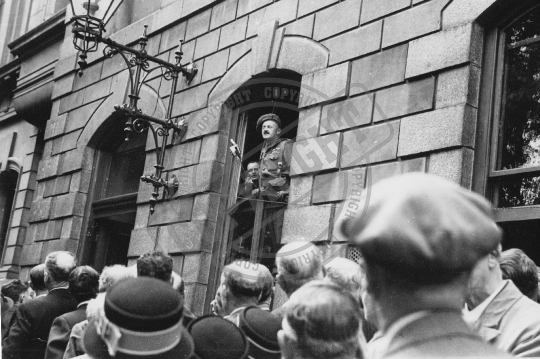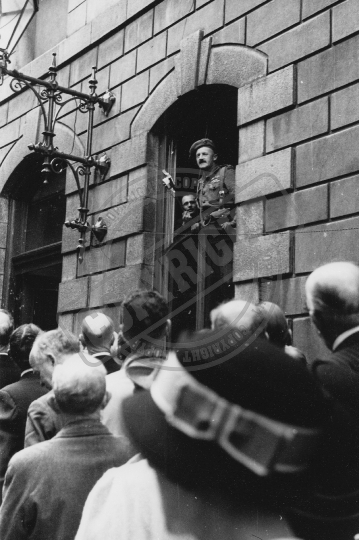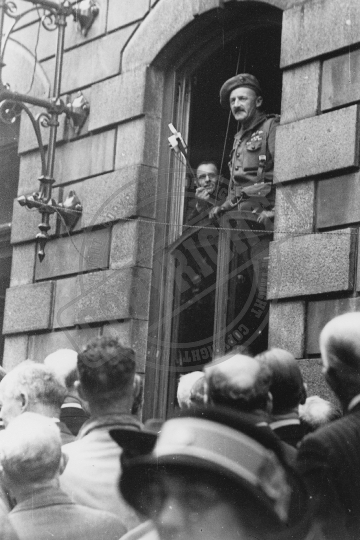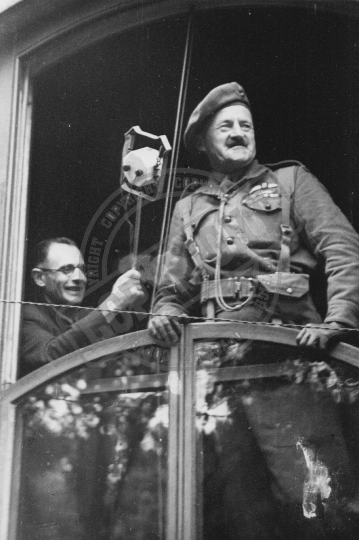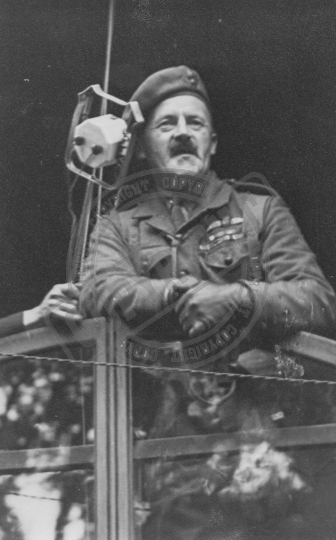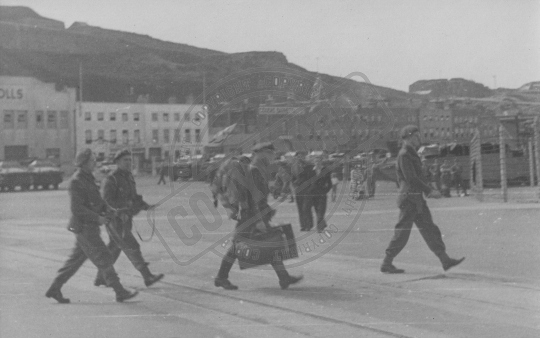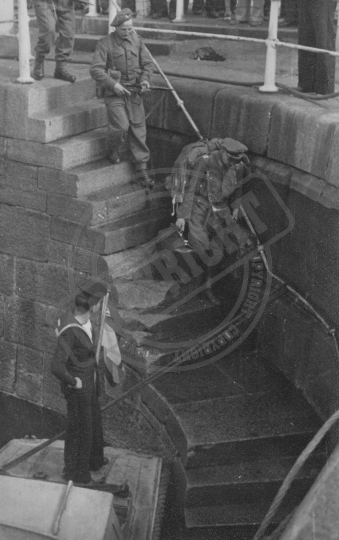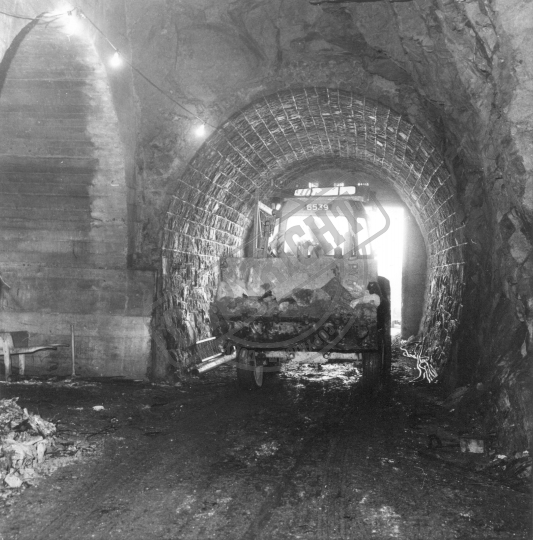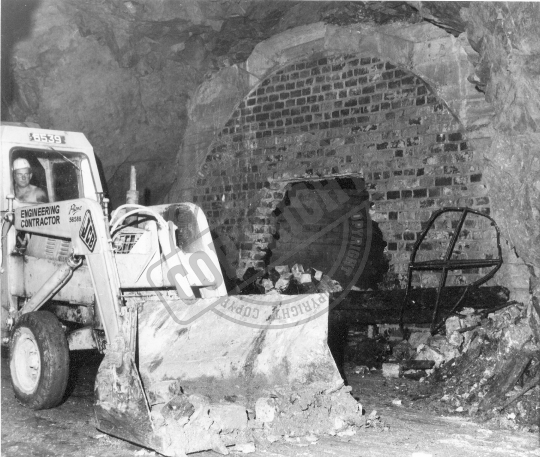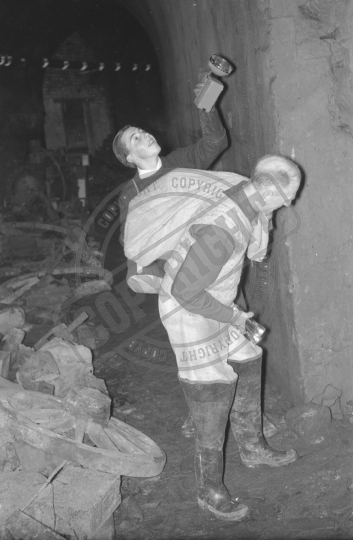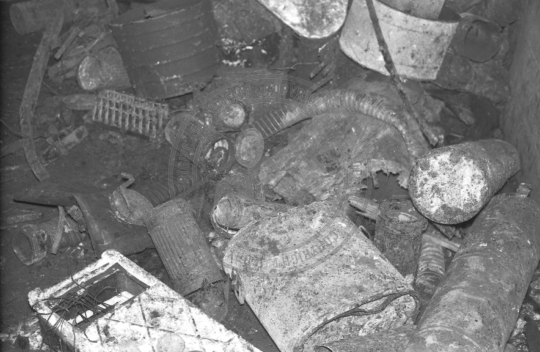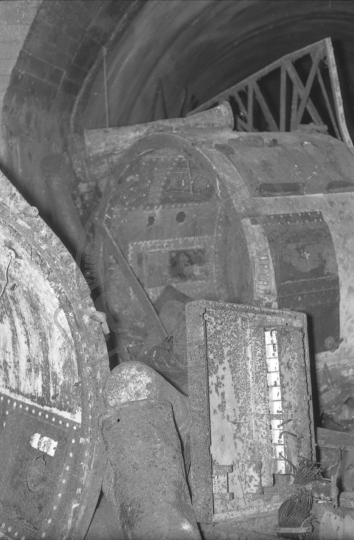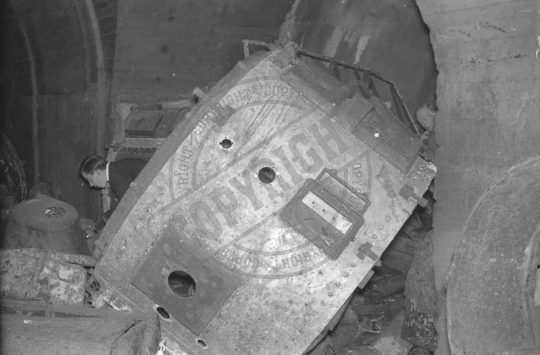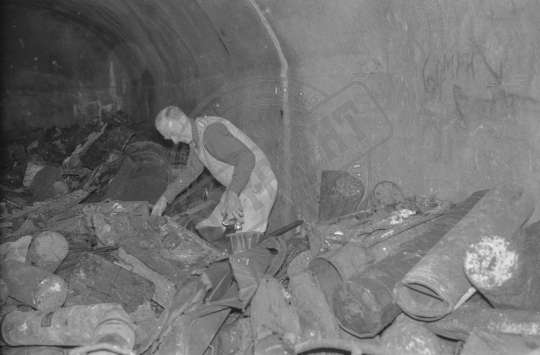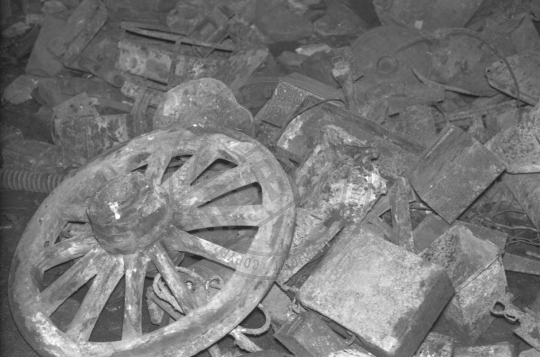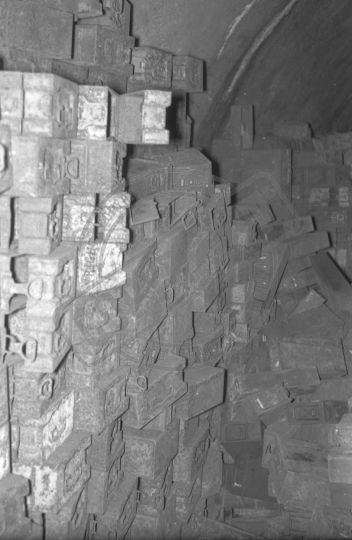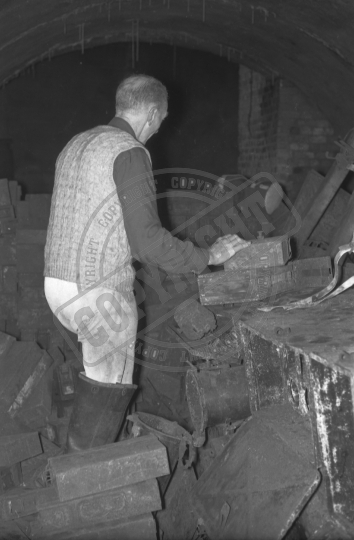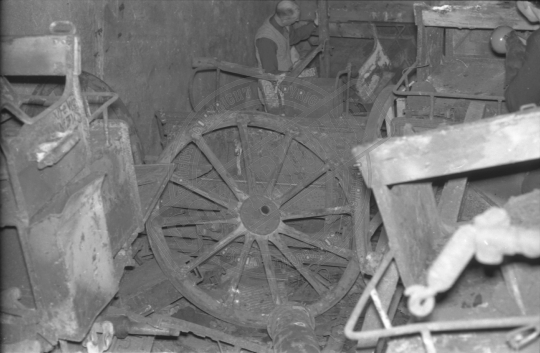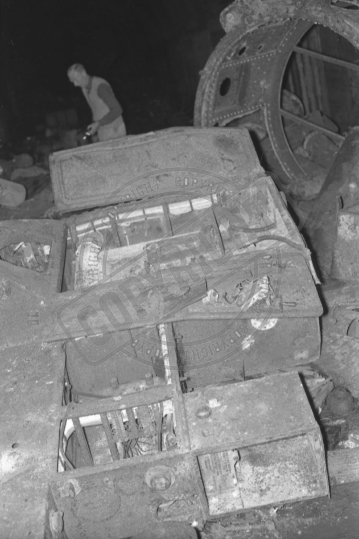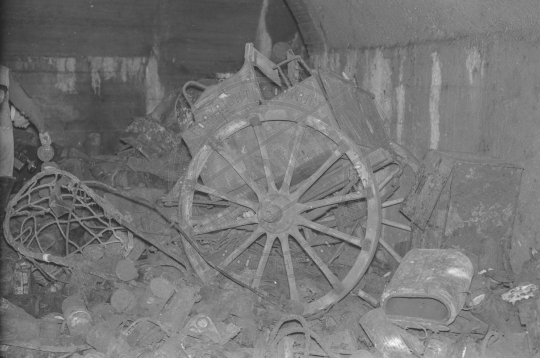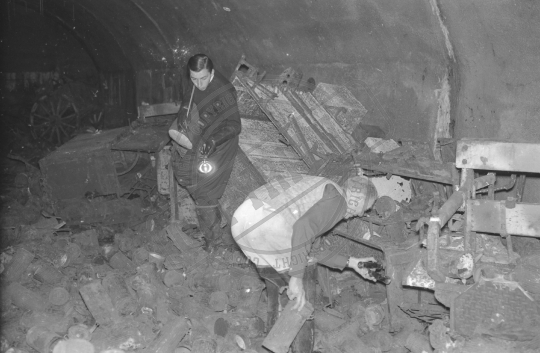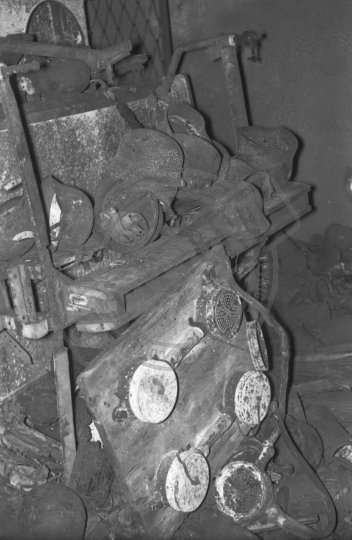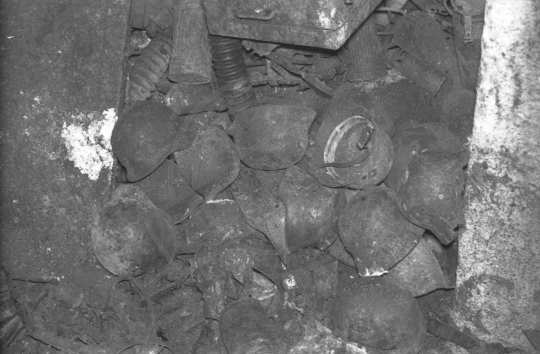Results (598)
OA_003
The crowds in front of the Court House burst into singing the National Anthem as they witnessed the Hoisting of the Union Flag, on the 9th May, 1945. God save the King rang out over St Peter Port, followed by a thunderous outburst of sustained cheering.
OA_002
Brigadier Snow accepted the formal surrender of the German Garrison from Vizeadmiral Hüffmeier at 11.00 hours on Saturday, 12th May, at the former German Naval Headquarters, the Crown Hotel, St Peter Port. He is seen here leaving the Hotel with his ADC, Oberleutnant Edwald Severing. Hüffmeier was escorted to the harbour for evacuation to England. On the left of the photograph, with his back to the camera, is a War Correspondent from the PR Section of Force 135. Note the barbed wire that has been draped from the balcony to the railings.
CIMM_0036
Recently liberated Algerian POWs stand at Pier Road, Jersey on the 24th May 1945 prior to the Empire Day parade. Note the assortment of uniforms.
CIMM_0035
From the 13th to the 19th May, 1945 the majority of the German garrison were evacuated to POW camps in the UK. Here, German POWs are driven down to West Park, Jersey by DUKW.
CIMM_0034
Troops arrive at the Weighbridge, St Helier aboard six DUKWs pre-loaded with stores having been transported to Jersey on the USS LST 527.
CIMM_0033
A hive of activity taking place at the side door of the Pomme d 'Or Hotel in Conway Street, Jersey. German prisoners are guarded by British troops. The vehicles are a Morris and a Bedford 15 cwt which had been captured by the
CIMM_0032
British troops gather on the balcony of the Pomme d`Or Hotel following the raising of the Union flag on the afternoon of 9th May 1945.
CIMM_0031
On the afternoon of 9th May, 1945, the first detachment of troops of Task Force 135, led by Colonel Robinson, landed at the Albert Pier. After marching to the Weighbridge, they set up their headquarters at the Pomme d'Or Hotel. Upon their arrival, the Harbourmaster, Captain Richmond, hoisted the Union Flag over the balcony.
CIMM_0030
British troops stand guard outside the Pomme d`Or Hotel in the days following Liberation. The hotel was the Naval headquarters for the German Kriegsmarine. Note the sentry box to the right of the main entrance.
CIMM_0029
Crowds gather in anticipation at the harbour offices, St Helier, Jersey on the morning of 9th May 1945 where the advance party Omelette are preparing to address the crowd.
CIMM_0028
Crowds gather outside the harbour office in St Helier, Jersey on 9th May 1945 to witness a large Union Flag being draped from the first floor by Surgeon-Lieutenant McDonald with the assistance of Sub-Lieutenant David Milne.
CIMM_0027
Accompanied by Generalmajor Wulf and two staff officers standing at the rear of the Royal Navy pinnace the Bailiff and solicitor general wave their hats as they head out to HMS Beagle where the surrender will be signed.
CIMM_0026
German officers from the Kriegsmarine and Wehrmacht aboard the FK01 leave St Helier harbour to rendezvous with HMS Beagle on 9th May 1945.
CIMM_0025
Crowds gather to hear Winston Churchill’s speech in Royal Square, St Helier, Jersey on the afternoon of Tuesday 8th May 1945.
CIMM_0024
This was the scene in the Royal Square, St Helier, Jersey on Tuesday the 8th May 1945 as a huge crowd gathered to hear Winston Churchill’s speech to mark the end of the war and a historical moment for the occupied Channel Islands.
CIMM_0019
Jersey, Saturday 12th May, 1945. Members of Force 135 from the initial Phases of Operation 'Moslem’ still wearing their life-vests congregate at the Weighbridge Transit Area and await orders to move to the Assembly Areas or Objectives. Behind is the Pomme d’Or Hotel that was the Tactical HQ of Force 135.
CIMM_0018
Two of the four Landing Ship Tank, the US LST 521 and 527, that beached in St Aubin’s Bay, Jersey, on Sunday 13th May, 1945.
CIMM_0017
The bow doors of the beached American US LST 542 are open and the crew and British troops have commenced disembarkation. St Aubin’s Bay, Jersey on Sunday 13th May, 1945.
CIMM_0016
The bow doors of the beached American US LST 521 are open and the crew and British troops wait patiently onboard for the tide to recede sufficiently for the ramp to be lowered so that disembarkation can commence. St Aubin’s Bay, Jersey on Sunday 13th May, 1945.
CIMM_0015
The British troops received a warm welcome from the crowds lining the top of the sea wall as they disembarked from the Landing ship tank. Through the open bow doors of the HM LST 238 the troops step ashore. In the foreground a Military Policeman gives a child some friendly advice about the dangers of being on the beach as the vehicles drive off.
CIMM_0014
DUKWs from 1758 Independent Platoon, Royal Army Service Corps, came ashore at the Old Lifeboat Station Slip on Saturday 12th May, 1945. They drove along Commercial Buildings and initially parked in the Transit Area at the Weighbridge.
CIMM_0013
Surgeon-Lieutenant Ronald McDonald, RNVR, and Sub-Lieutenant David Milln, RN, shortly after landing at the end of the Albert Pier, St Helier, Harbour, Jersey, on Wednesday morning 9th May, 1945. The German sign behind them advises Achtung Nicht Ankern Hafenspere (Attention No Anchoring Harbour Boom).
CIMM_0012
The crew of HMS Beagle’s launch make ready to land, and the first Liberators stepped ashore at the end of the Albert Pier, St Helier Harbour, Jersey, on Wednesday morning, 9th May, 1945. The two officers on board were Surgeon-Lieutenant Ronald McDonald, RNVR, and Sub-Lieutenant David Milln, RN.
CIMM_0011
The crew of HMS Beagle’s launch make ready to land, and the first Liberators stepped ashore at the end of the Albert Pier, St Helier Harbour, Jersey, on Wednesday morning, 9th May, 1945. The two officers on board were Surgeon-Lieutenant Ronald McDonald, RNVR, and Sub-Lieutenant David Milln, RN.
CIMM_0010
The crew of HMS Beagle’s launch make ready to land, and the first Liberators stepped ashore at the end of the Albert Pier, St Helier Harbour, Jersey, on Wednesday morning, 9th May, 1945. The two officers on board were Surgeon-Lieutenant Ronald McDonald, RNVR, and Sub-Lieutenant David Milln, RN.
CIMM_0009
Addresses to the crowd, from a window of the States Buildings. Many people had gathered in the Royal Square, St Helier, Jersey, for the Hoisting of the Flag Ceremony, on Thursday 10th May, 1945.
CIMM_0008
Addresses to the crowd, from a window of the States Buildings. Many people had gathered in the Royal Square, St Helier, Jersey, for the Hoisting of the Flag Ceremony, on Thursday 10th May, 1945.
CIMM_0007
Lieutenant-Colonel William Robinson, MC, RA, Island commander Jersey, addresses the crowd, from a window of the States Buildings, who had gathered in the Royal Square, St Helier, Jersey, for the Hoisting of the Flag Ceremony, on Thursday 10th May, 1945.
CIMM_0006
Lieutenant-Colonel William Robinson, MC, RA, Island commander Jersey, addresses the crowd, from a window of the States Buildings, who had gathered in the Royal Square, St Helier, Jersey, for the Hoisting of the Flag Ceremony, on Thursday 10th May, 1945.
CIMM_0005
Lieutenant-Colonel William Robinson, MC, RA, Island commander Jersey, addresses the crowd, from a window of the States Buildings, who had gathered in the Royal Square, St Helier, Jersey, for the Hoisting of the Flag Ceremony, on Thursday 10th May, 1945.
CIMM_0004
Lieutenant-Colonel William Robinson, MC, RA, Island commander Jersey, addresses the crowd from a window of the States Buildings, who had gathered in the Royal Square, St Helier, Jersey, for the Hoisting of the Flag Ceremony, on Thursday 10th May, 1945.
CIMM_0003
Lieutenant-Colonel William Robinson, MC, RA, Island commander Jersey, addresses the crowd, from a window of the States Buildings, who had gathered in the Royal Square, St Helier, Jersey, for the Hoisting of the Flag Ceremony, on Thursday, 10th May, 1945.
CIMM_0002
A German Oberleutnant, possibly Richard Bode of the German Secret Field Police (Geheime Feldpolizie or GFP), being escorted across the Weighbridge, St Helier, Jersey, from Force 135 Tactical HQ at the Pomme d’Or Hotel by armed British troops led by Major Margesson, GSOII, towards the New North Quay, on Sunday, 13th May, 1945. Note the DUKWs in the background.
CIMM_0001
A German Oberleutnant, possibly Feldpoliziinspector u. Dienstellenleiter Richard Bode of the German Secret Field Police (Geheime Feldpolizie or GFP), escorted by armed British troops descends the steps at the head of the New North Quay, on Sunday, 13th May, 1945. He was taken by launch to a waiting LSI anchored in St Aubin’s Bay then on to the UK and a POW camp.
TPL_00369
The German tunnel complex Ho.8 at La Valette was eventually cleaned out entirely in the early 1960’s prior to its conversion into an aquarium.
TPL_00368
The German tunnel complex Ho.8 at La Valette was eventually cleaned out entirely in the early 1960’s prior to its conversion into an aquarium.
TPL_00352
St Saviour`s tunnel which is featured in many publications as 'The tunnel under the church’ is one of the largest German tunnel complexes in Guernsey. This tunnel was originally constructed as a ration store and in 1944 it was converted into a munitions store. On 9th May 1969 Richard Heaume and John Hayes explored the remains of the tunnel and its contents which had captured the interest of many collectors ever since the scrap men had left in the 1950’s.
TPL_00351
St Saviour`s tunnel which is featured in many publications as 'The tunnel under the church’ is one of the largest German tunnel complexes in Guernsey. This tunnel was originally constructed as a ration store and in 1944 it was converted into a munitions store. On 9th May 1969 Richard Heaume and John Hayes explored the remains of the tunnel and its contents which had captured the interest of many collectors ever since the scrap men had left in the 1950’s.
TPL_00350
St Saviour`s tunnel which is featured in many publications as 'The tunnel under the church’ is one of the largest German tunnel complexes in Guernsey. This tunnel was originally constructed as a ration store and in 1944 it was converted into a munitions store. On 9th May 1969 Richard Heaume and John Hayes explored the remains of the tunnel and its contents which had captured the interest of many collectors ever since the scrap men had left in the 1950’s.
TPL_00349
St Saviour`s tunnel which is featured in many publications as 'The tunnel under the church’ is one of the largest German tunnel complexes in Guernsey. This tunnel was originally constructed as a ration store and in 1944 it was converted into a munitions store. On 9th May 1969 Richard Heaume and John Hayes explored the remains of the tunnel and its contents which had captured the interest of many collectors ever since the scrap men had left in the 1950’s.
TPL_00348
St Saviour`s tunnel which is featured in many publications as 'The tunnel under the church’ is one of the largest German tunnel complexes in Guernsey. This tunnel was originally constructed as a ration store and in 1944 it was converted into a munitions store. On 9th May 1969 Richard Heaume and John Hayes explored the remains of the tunnel and its contents which had captured the interest of many collectors ever since the scrap men had left in the 1950’s.
TPL_00347
St Saviour`s tunnel which is featured in many publications as 'The tunnel under the church’ is one of the largest German tunnel complexes in Guernsey. This tunnel was originally constructed as a ration store and in 1944 it was converted into a munitions store. On 9th May 1969 Richard Heaume and John Hayes explored the remains of the tunnel and its contents which had captured the interest of many collectors ever since the scrap men had left in the 1950’s.
TPL_00346
St Saviour`s tunnel which is featured in many publications as 'The tunnel under the church’ is one of the largest German tunnel complexes in Guernsey. This tunnel was originally constructed as a ration store and in 1944 it was converted into a munitions store. On 9th May 1969 Richard Heaume and John Hayes explored the remains of the tunnel and its contents which had captured the interest of many collectors ever since the scrap men had left in the 1950’s.
TPL_00345
St Saviour`s tunnel which is featured in many publications as 'The tunnel under the church’ is one of the largest German tunnel complexes in Guernsey. This tunnel was originally constructed as a ration store and in 1944 it was converted into a munitions store. On 9th May 1969 Richard Heaume and John Hayes explored the remains of the tunnel and its contents which had captured the interest of many collectors ever since the scrap men had left in the 1950’s.
TPL_00344
St Saviour`s tunnel which is featured in many publications as 'The tunnel under the church’ is one of the largest German tunnel complexes in Guernsey. This tunnel was originally constructed as a ration store and in 1944 it was converted into a munitions store. On 9th May 1969 Richard Heaume and John Hayes explored the remains of the tunnel and its contents which had captured the interest of many collectors ever since the scrap men had left in the 1950’s.
TPL_00343
St Saviour`s tunnel which is featured in many publications as 'The tunnel under the church’ is one of the largest German tunnel complexes in Guernsey. This tunnel was originally constructed as a ration store and in 1944 it was converted into a munitions store. On 9th May 1969 Richard Heaume and John Hayes explored the remains of the tunnel and its contents which had captured the interest of many collectors ever since the scrap men had left in the 1950’s.
TPL_00342
St Saviour`s tunnel which is featured in many publications as 'The tunnel under the church’ is one of the largest German tunnel complexes in Guernsey. This tunnel was originally constructed as a ration store and in 1944 it was converted into a munitions store. On 9th May 1969 Richard Heaume and John Hayes explored the remains of the tunnel and its contents which had captured the interest of many collectors ever since the scrap men had left in the 1950’s.
TPL_00341
St Saviour`s tunnel which is featured in many publications as 'The tunnel under the church’ is one of the largest German tunnel complexes in Guernsey. This tunnel was originally constructed as a ration store and in 1944 it was converted into a munitions store. On 9th May 1969 Richard Heaume and John Hayes explored the remains of the tunnel and its contents which had captured the interest of many collectors ever since the scrap men had left in the 1950’s.
TPL_00340
St Saviour`s tunnel which is featured in many publications as 'The tunnel under the church’ is one of the largest German tunnel complexes in Guernsey. This tunnel was originally constructed as a ration store and in 1944 it was converted into a munitions store. On 9th May 1969 Richard Heaume and John Hayes explored the remains of the tunnel and its contents which had captured the interest of many collectors ever since the scrap men had left in the 1950’s.
TPL_00339
St Saviour`s tunnel which is featured in many publications as 'The tunnel under the church’ is one of the largest German tunnel complexes in Guernsey. This tunnel was originally constructed as a ration store and in 1944 it was converted into a munitions store. On 9th May 1969 Richard Heaume and John Hayes explored the remains of the tunnel and its contents which had captured the interest of many collectors ever since the scrap men had left in the 1950’s.



